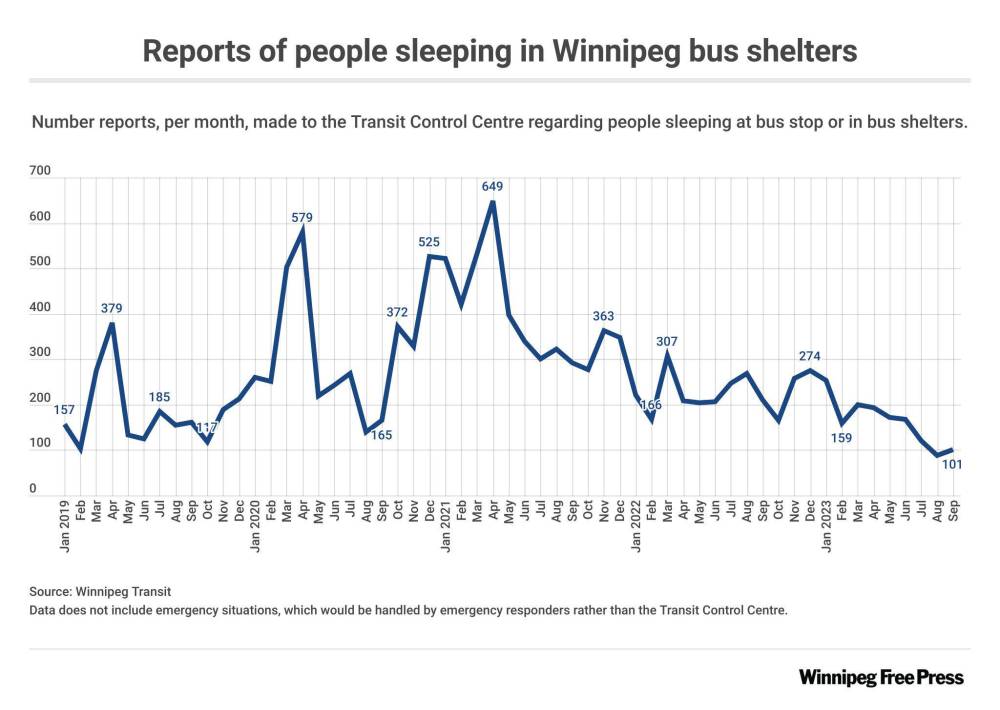Fewer reports of homeless sleeping in bus shacks, but problem persists
Advertisement
Read this article for free:
or
Already have an account? Log in here »
To continue reading, please subscribe:
Monthly Digital Subscription
$0 for the first 4 weeks*
- Enjoy unlimited reading on winnipegfreepress.com
- Read the E-Edition, our digital replica newspaper
- Access News Break, our award-winning app
- Play interactive puzzles
*No charge for 4 weeks then price increases to the regular rate of $19.00 plus GST every four weeks. Offer available to new and qualified returning subscribers only. Cancel any time.
Monthly Digital Subscription
$4.75/week*
- Enjoy unlimited reading on winnipegfreepress.com
- Read the E-Edition, our digital replica newspaper
- Access News Break, our award-winning app
- Play interactive puzzles
*Billed as $19 plus GST every four weeks. Cancel any time.
To continue reading, please subscribe:
Add Free Press access to your Brandon Sun subscription for only an additional
$1 for the first 4 weeks*
*Your next subscription payment will increase by $1.00 and you will be charged $16.99 plus GST for four weeks. After four weeks, your payment will increase to $23.99 plus GST every four weeks.
Read unlimited articles for free today:
or
Already have an account? Log in here »
Hey there, time traveller!
This article was published 01/11/2023 (770 days ago), so information in it may no longer be current.
Winnipeg Transit is receiving fewer reports of homeless people sleeping inside bus shacks, but outreach workers and city staff who remove human waste and needles from the shelters say more work is needed.
The number of calls to the Winnipeg Transit Control Centre about people sleeping in the heated, partially enclosed shelters fell to its lowest level in years each month so far in 2023, except January (which was slightly higher than January 2022), according to data obtained by the Free Press.
The total number of calls dropped from 4,761 in 2021 to 2,733 the following year. And the number this year was 1,451 at the end of September.
The head of one outreach organization said she has noticed an improvement, but the matter still keeps her staff busy.
WINNIPEG FREE PRESS FILES The number of calls to the Winnipeg Transit Control Centre about people sleeping in heated, partially enclosed city bus shelters fell to its lowest level in years each month so far in 2023.
“It is true that there are far less people in transit shelters this year than in prior years.… (But we’re still) making contact with people in transit shelters on the daily or several times a day,” said Marion Willis, executive director of St. Boniface Street Links.
While speaking with the Free Press Wednesday, Street Links received a report of someone taking shelter in a St. Mary’s Road bus shelter.
However, Willis said there has been a significant decline in those calls, something she largely credits to “proactive work” by Winnipeg Transit and outreach workers to connect homeless people with alternatives, along with the end of COVID-19 restrictions.
“I think that what we’re doing is paying off… I think it’s (also) a sign that we’re recovering somewhat from the pandemic. In the two years of the pandemic, it really increased the number of people that were staying in transit shelters.… We just saw so many people spiral down into addiction and homelessness because there were no services to access,” she said.
Those agencies have largely resumed operations and Transit staff are helping direct people to support services.
“It is true that there are far less people in transit shelters this year than in prior years.… (But we’re still) making contact with people in transit shelters on the daily or several times a day.”–Marion Willis, executive director of St. Boniface Street Links
“It’s not about telling people in a harsh way that they can’t be there. It’s about explaining to individuals that this transit shelter is probably not the best way to live; ‘How about we connect you to income supports if you don’t have it, and how about we find you some housing?’” said Willis.
A request to interview a Winnipeg Transit official on the matter was declined Wednesday.
In an email, Transit spokeswoman Megan Benedictson said staff assess the circumstances of people staying in bus shacks and are able to provide information about emergency shelters.
“Bus operators who observe someone sleeping in our shelters are instructed to notify our control centre, so inspectors and/or emergency personnel can respond,” she said.
Member of the public who call 311 about an emergency involving someone sleeping in a bus shelter will be directed to call 911. Those calls may not be reported to the Transit control centre, she noted.
The head of the union that represents bus drivers said the acknowledged the improved data but said Transit staff are still coping with extensive cleanups.
“They’re cleaning up garbage, even needles, bodily fluids, (feces), just about everything that you can think of,” said Chris Scott, president of the Amalgamated Transit Union Local 1505.
Scott said the numbers could rise again as the temperatures falls.
Mayor Scott Gillingham credited the improving situation to city investments in safe spaces and extreme-weather responses, as well as the end of the pandemic.
“It’s probably a combination of things… however, there are still people using bus shelters (this way) and that’s really no place for people to be living…. They need assistance, so I want to see these numbers continue to go down,” said Gillingham. ]
“We’re doing a lot of good work with all the agencies who are helping… but there’s more work to do.”
The mayor said the city will continue to focus on ensuring more affordable housing and wrap-around support services are available while keeping Transit shelters open for bus riders to use.
“Addressing homelessness is a top priority of mine,” he said.
joyanne.pursaga@freepress.mb.ca
X: @joyanne_pursaga

Joyanne is city hall reporter for the Winnipeg Free Press. A reporter since 2004, she began covering politics exclusively in 2012, writing on city hall and the Manitoba Legislature for the Winnipeg Sun before joining the Free Press in early 2020. Read more about Joyanne.
Every piece of reporting Joyanne produces is reviewed by an editing team before it is posted online or published in print — part of the Free Press‘s tradition, since 1872, of producing reliable independent journalism. Read more about Free Press’s history and mandate, and learn how our newsroom operates.
Our newsroom depends on a growing audience of readers to power our journalism. If you are not a paid reader, please consider becoming a subscriber.
Our newsroom depends on its audience of readers to power our journalism. Thank you for your support.






